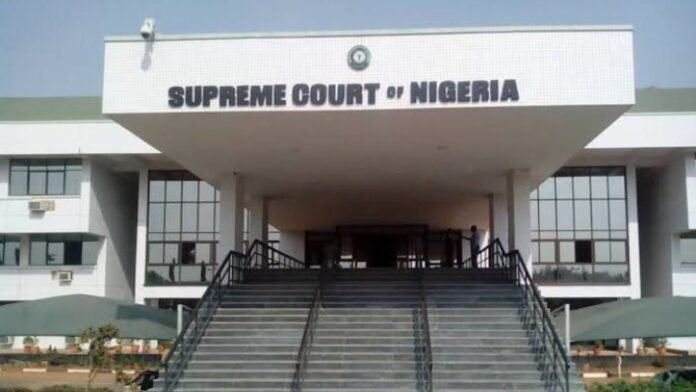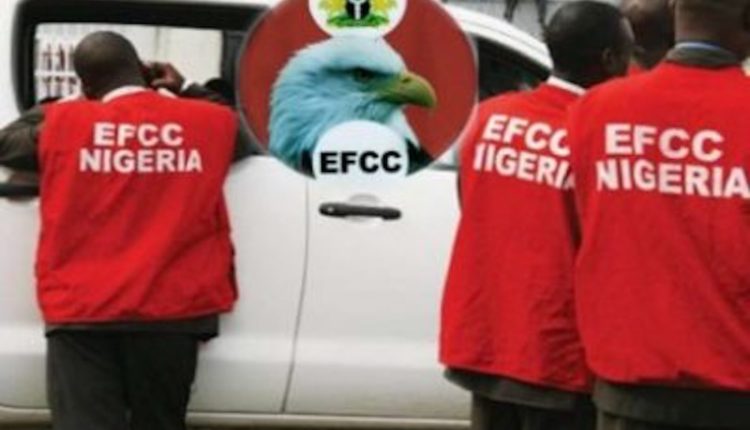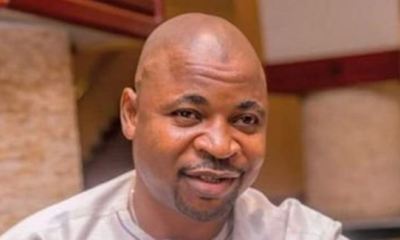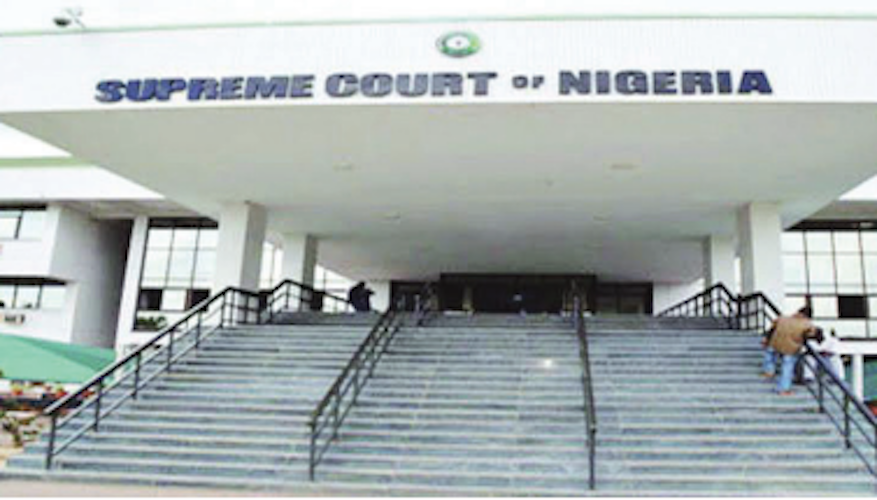Law
LG Autonomy: Senator Daniel Congratulates President Tinubu, Supreme Court

***Abba Moro applauds SC, says its victory for democracy
The landmark Supreme Court judgement which granted full financial autonomy to the Local Government administration has been applauded by former Governor of Ogun State and Senator representing Ogun East Senatorial District Otunba Gbenga Daniel and the senator representing Benue South Senatorial District and Senate Minority Leader,
Senator Abba Moro.
While Otumba Daniel described it as
President Bola Ahmed Tinubu’s demonstration of uncommon courage and leadership in a manner that seeks to return Nigeria on a trajectory of growth and development, Moro applauds Supreme Court judgement on local government autonomy, said it’s victory for democracy, Nigerians.
According to Otunba Daniel, “This constitutional resolution is long overdue because the local government administration is the closest to the grassroots and they should have the capacity to impact directly on the lives of the people through the initiation of life-changing programs and projects.
“President Tinubu and the Supreme Court have restored sanity to the Nigerian political space as this will allow the dividends of democracy to reach the masses.
“As a Democrat, and a Progressive one at that, Asiwaju Bola Tinubu has demonstrated enormous capacity in the struggle towards strengthening the Nigeria’s Democracy, and with this Local Government financial autonomy, he has once again set to recalibrate the wheels of our political and Economic growth in a way that it will make clear meanings to the average citizens.
“I salute Mr. President for this global road map that will usher in true and practical development in our nation”
Comrade Moro said the apex court, while delivering judgement on the suit filed by the Attorney General of the Federation, Lateef Fagbemi (SAN) on behalf of the Federal Government, seeking full autonomy for local government councils in the country, had declared that local government councils should receive and manage their allocations themselves.
The court said state government had no power to dissolve a democratically-elected local government council and putting in place a caretaker committee, stating that only democratically-elected local government councils are constitutionally and legally recognized.
According to him, the Thursday ruling is victory for democracy and Nigerians.
He said the court remains the last hope of the common man, stating that the ruling will bring rapid development to the grassroots where majority of Nigerians live and transact businesses.
He charged governors to abide by the ruling and allow the local government to function optimally for the overall good of all Nigerians.
You will recall that the Nigerian Senate, on 1st December, 2023 through a motion moved by Senator Moro had condemned arbitrary dissolution of democratically elected local government councils by governors and urged the federal government to withhold statutory allocations to councils not democratically elected.
The senator is also sponsoring a constitutional amendment bill seeking local government administrative and financial autonomy, to give local government areas financial and administrative independence to make progress. The bill has since passed First Reading.
Senator Moro, a strong advocate of local government autonomy, has been in the forefront of the struggle for total freedom of local governments from the firm grips of state governments, which he believes will speed up infrastructural development at the local level. He commends the highly revered judges of the Supreme Court for the judgement and says t
hey 00⁰have saved and strengthened Nigerian democracy.
Law
EFCC Grants Bail to Two Kogi Officials, wants Yahaya Bello’s Fraud Case adjurned

The Economic and Financial Crimes Commission (EFCC) has granted administrative bail to two co-defendants, Umar Oricha and Abdulsalami Hudu, in a fraud case involving former Kogi State Governor, Yahaya Bello. The case, centered on charges of fraud totaling N101.4 billion, has been adjourned until November 27, 2024, by the Federal High Court in Abuja.
At the hearing before Justice Maryann Anenih, EFCC Counsel Jamiu Agoro requested an adjournment, noting that the 30-day compliance period for Bello’s summons, issued on October 3, had not yet expired. Agoro explained that the November 20 court date was inconvenient for the prosecution, and that seeking an arrest warrant would be premature as Bello still had a few days to respond to the summons.
Both the second and third defendants’ legal representatives supported the adjournment request.
Following this, Justice Anenih approved the EFCC’s request, extending the deadline for Bello’s appearance and authorizing service of the hearing notice to be sent to his last known address.
In a parallel development, the Federal Capital Territory (FCT) High Court in Maitama ordered a hearing notice to be posted at Bello’s residence on Benghazi Street, Wuse Zone 4, Abuja, and on the court’s notice board.
This step follows multiple missed court appearances by Bello since the public summons was issued, urging him to appear for arraignment on 16 counts related to the alleged fraud.
Justice Anenih emphasized the importance of due process, setting November 27, 2024, as the final date for Bello’s court appearance. This case has drawn attention to the EFCC’s efforts to enforce accountability among high-profile figures in Nigeria amidst allegations of large-scale financial mismanagement.
Law
Appeal Court Sacks MC Oluomo as NURTW National President, Reaffirms Baruwa’s Leadership

In a significant development, the Court of Appeal has annulled the appointment of Musiliu Akinsanya, popularly known as MC Oluomo, as the National President of the National Union of Road Transport Workers (NURTW).
The ruling upheld a previous ruling by the National Industrial Court, which had already recognized Tajudeen Baruwa as the rightful leader of the union.
The legal dispute surrounding the NURTW’s leadership has been ongoing, with tensions escalating within the organization.
Despite the court’s ruling in favor of Baruwa, MC Oluomo was recently elected by the Southwest Zone of the union during the Quadrennial Delegate Conference held last week in Osogbo, Osun State.
This election took place amid growing concerns and disputes within the union’s regional factions.
The Appeal Court’s decision is expected to settle the leadership question, restoring Tajudeen Baruwa’s position as the legitimate National President of the NURTW.
However, the union faces potential challenges in maintaining unity across its various regional branches, as supporters of MC Oluomo continue to advocate for his leadership.
This ruling marks a pivotal moment for the NURTW, as it works to stabilize its governance and address internal divisions that have led to several controversies and disputes over recent years.
Law
Supreme Court Rejects States’ Legal Challenge to EFCC’s Constitutionality

The Supreme Court of Nigeria has thrown out a lawsuit brought by several state Attorneys General challenging the constitutional validity of the Economic and Financial Crimes Commission (EFCC). The case, led by Kogi State, questioned the EFCC Act, arguing that it bypassed constitutional requirements regarding international treaties.
The seven-member panel, headed by Justice Uwani Abba-Aji, ruled unanimously to reject the lawsuit, deeming it without merit. Kogi State’s counsel, Mohammed Abdulwahab, SAN, argued that the EFCC Act’s incorporation of the United Nations Convention Against Corruption was unconstitutional, as the law had not received approval from a majority of state Houses of Assembly, as required by Section 12 of the 1999 Constitution. This, he claimed, invalidated the EFCC Act and similar anti-corruption laws.
The plaintiffs also contended that the EFCC and NFIU lacked the authority to investigate state or local government funds, accusing the agencies of encroaching on state powers. Abdulwahab sought a court ruling to nullify the creation of these agencies, arguing it would prevent a potential constitutional crisis.
Attorney General of the Federation, Lateef Fagbemi, SAN, defended the EFCC, asserting that dismantling Nigeria’s anti-corruption agencies would harm the nation’s efforts to combat financial crimes. He argued that the National Assembly has the authority to create laws applicable nationwide to address corruption.
The court ultimately upheld the EFCC Act, ruling that the National Assembly’s legislative powers on corruption are valid and enforceable across all states. Justice Abba-Aji noted that Kogi’s revelations about state officials being investigated exposed ulterior motives behind the lawsuit, describing it as an attempt to shield certain officials.
“No state has the right to enact laws that contradict the statutes passed by the National Assembly,” Justice Abba-Aji said, delivering the judgment. The court dismissed the suit in its entirety, reaffirming that the EFCC Act and other federal anti-corruption laws remain constitutional and enforceable across Nigeria.
-

 Crime1 year ago
Crime1 year agoPolice nabs Killer of Varsity Lecturer in Niger
-

 News10 months ago
News10 months agoFCT-IRS tells socialite Aisha Achimugu not to forget to file her annual returns
-

 Appointment1 year ago
Appointment1 year agoTinubu names El-Rufai, Tope Fasua, others in New appointments
-

 News From Kogi1 year ago
News From Kogi1 year agoINEC cancells election in 67 polling units in Ogori-Magongo in Kogi
-

 News From Kogi1 year ago
News From Kogi1 year agoEchocho Challenges Tribunal Judgment ordering rerun in 94 polling units
-

 News1 year ago
News1 year agoIPOB: Simon Ekpa gives reason for seperatists clamour for Biafra
-

 Metro8 months ago
Metro8 months ago‘Listing Simon Ekpa among wanted persons by Nigeria military is rascality, intimidation’
-

 News10 months ago
News10 months agoKingmakers of Igu/ Koton-Karfe dare Bello, urge him to reverse deposition of Ohimege-Igu
